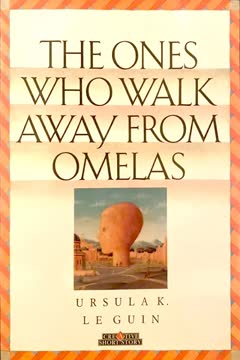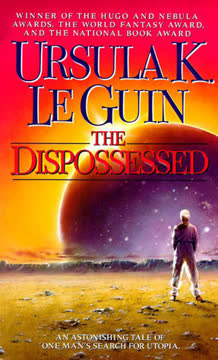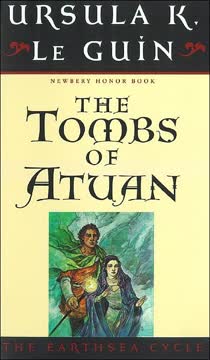Plot Summary
Festival Bells Ring Out
The city of Omelas bursts into life as the Festival of Summer begins, marked by the joyous clamor of bells and the soaring of swallows. The streets fill with processions—old and young, grave and merry—moving through a city adorned with flags, painted houses, and lush gardens. The air is clear, the mountains glow in the distance, and the city's beauty is palpable. The people gather at the Green Fields, where children and horses prepare for the day's races. The atmosphere is one of anticipation and communal joy, setting the stage for a city that seems to have achieved a rare and perfect happiness.
City of Unimaginable Joy
The narrator struggles to describe the true nature of Omelas' joy, emphasizing that its citizens are neither naive nor simple. They are intelligent, passionate, and mature, living lives free from wretchedness. Omelas is not a fairy tale, but a city where happiness is not equated with stupidity. The people have found a way to celebrate life without violence, oppression, or the trappings of power. Their joy is deep, communal, and sophisticated, challenging the reader's assumptions about the nature of happiness and the possibility of a utopian society.
No Kings, No Slaves
Omelas is remarkable for what it lacks: there are no kings, no slaves, no secret police, and no violence. The city functions without the usual structures of authority or coercion. Its people are free, and their happiness is not built on the suffering of others—at least, not in any obvious way. The absence of hierarchy and exploitation is central to Omelas' identity, inviting the reader to imagine a society where joy is not tainted by domination or cruelty, and where the usual sources of conflict are absent.
The Art of Happiness
The Citizens of Omelas have mastered the art of distinguishing between what is necessary, unnecessary, and destructive. Their happiness is not mindless indulgence, but a thoughtful, ethical pursuit. They enjoy comfort and luxury without excess, and their pleasures are communal and inclusive. The city's joy is not dependent on material wealth or technological advancement, but on a shared sense of purpose and mutual respect. Omelas challenges the notion that happiness is trivial or unintellectual, presenting it instead as a profound and deliberate achievement.
Imagining Omelas' Perfection
The narrator acknowledges the difficulty of describing Omelas in a way that satisfies every reader. The city's perfection is left partly to the imagination, allowing each person to fill in the details according to their own desires and ideals. Whether Omelas has advanced technology or simple pleasures, the essence remains the same: a city where joy is abundant and guilt is absent. The narrator even suggests adding elements like orgies or drugs if it helps the reader believe in Omelas' happiness, emphasizing the flexibility and inclusivity of this imagined utopia.
The Summer Race Begins
As the festival reaches its peak, the Citizens of Omelas gather for the horse race, a symbol of their communal spirit and exuberance. The air is filled with the smells of food, the laughter of children, and the excitement of the young riders. The city's joy is tangible, expressed through music, dance, and shared rituals. The race is not a competition for dominance, but a celebration of life and vitality. The festival encapsulates the spirit of Omelas: a society united in joy, free from fear and conflict.
The Flute Player's Song
Amid the festivities, a solitary child plays a wooden flute, lost in the magic of music. The people pause to listen, recognizing the beauty and innocence of the moment. The child's song is a symbol of the city's purity and the possibility of untainted joy. Yet, this private silence also foreshadows the hidden darkness beneath Omelas' surface. The juxtaposition of public celebration and private reverie hints at the complexity of the city's happiness and the secrets it conceals.
Hidden Beneath the Surface
The narrator challenges the reader's belief in Omelas' perfection, hinting that there is more to the city than meets the eye. The idyllic surface is about to be disrupted by a revelation that will test the reader's understanding of happiness and morality. The transition from celebration to secrecy prepares the reader for the story's central paradox, inviting a deeper exploration of the costs and conditions of utopia.
The Child in the Cellar
Beneath one of Omelas' beautiful buildings lies a locked, windowless room. Inside, the Child in the Cellar—malnourished, neglected, and terrified—lives in filth and isolation. The child's misery is absolute: it is afraid, abused, and deprived of all comfort. The Citizens of Omelas know the child is there, and their happiness depends entirely on its suffering. The child's existence is the dark secret at the heart of Omelas, a necessary evil that sustains the city's joy. The horror of the child's plight stands in stark contrast to the beauty above.
The Price of Happiness
The citizens of Omelas are fully aware that their prosperity, health, and harmony depend on the child's abominable misery. This knowledge is not hidden; it is explained to every child as soon as they are old enough to understand. The terms are strict: the child must remain in suffering, and no kindness can be shown. The people's happiness is thus revealed to be conditional, purchased at the cost of one innocent life. The moral dilemma is inescapable, forcing each citizen to confront the price of their joy.
The Children Learn the Truth
When young people in Omelas learn about the child, they are invariably shocked and sickened. Their initial response is outrage, grief, and a desperate desire to help. Yet, they are told that any attempt to aid the child would destroy the happiness of all. Over time, most come to accept this terrible bargain, rationalizing the necessity of the child's suffering. The process of learning the truth marks a loss of innocence and a confrontation with the limits of compassion and justice.
The Paradox of Compassion
The citizens' awareness of the child's suffering does not lead to apathy or cruelty. Instead, it makes them more compassionate, gentle, and wise. Their happiness is not irresponsible or ignorant; it is shadowed by the knowledge of the child's pain. The paradox is that their empathy is both genuine and powerless—they cannot change the terms of the bargain. The existence of the child becomes the source of their nobility and the poignancy of their joy, even as it exposes the limits of their morality.
Acceptance and Rationalization
Over time, most citizens rationalize the child's suffering, convincing themselves that it is necessary and even just. They argue that the child is too damaged to benefit from freedom, and that the happiness of thousands outweighs the misery of one. Their tears dry, and they return to their lives, carrying the weight of this knowledge. The process of acceptance is both a psychological defense and a moral failure, revealing the complexity of human responses to injustice.
The Weight of Knowledge
The Citizens of Omelas are not free; their happiness is always shadowed by the knowledge of the child's suffering. This awareness shapes their relationships, their art, and their sense of self. They are gentle with children, wise in their pursuits, and careful in their pleasures, all because they know what their joy costs. The burden of complicity is both a source of depth and a mark of limitation, defining the character of Omelas and its people.
The Ones Who Cannot Stay
Not everyone in Omelas can live with the knowledge of the child's suffering. Occasionally, a young person or adult, after seeing the child, falls silent and then leaves the city. These individuals do not protest or attempt to change the system; instead, they simply walk away. Their departure is quiet, solitary, and final. They reject the terms of Omelas' happiness, choosing the unknown over complicity. Their actions raise profound questions about the possibility of moral purity and the limits of collective happiness.
Walking Into the Unknown
The ones who walk away leave Omelas behind, passing through its gates and into the darkness beyond. They go alone, without hope of return or knowledge of what lies ahead. Their journey is a leap into uncertainty, a refusal to accept happiness built on suffering. The place they seek is unimaginable, perhaps nonexistent, but their choice affirms the possibility of another way. Their departure is both a condemnation of Omelas and a testament to the enduring power of conscience.
The Unimaginable Beyond
The narrator cannot describe where the exiles go, only that they seem to know. The place beyond Omelas is left to the reader's imagination—a symbol of hope, possibility, or perhaps nothingness. The story ends with ambiguity, inviting the reader to consider what it means to walk away, and whether true happiness can ever be separated from suffering. The unresolved ending challenges the reader to confront their own values and the choices they would make in Omelas.
Characters
The Citizens of Omelas
The people of Omelas are not individuals but a collective character, representing the full spectrum of human maturity, intelligence, and ethical struggle. They are capable of deep joy, compassion, and communal celebration, yet their happiness is built on a terrible secret. Their psychological journey—from innocence to knowledge, from outrage to acceptance—mirrors the reader's own confrontation with moral compromise. The citizens' ability to rationalize the suffering of one for the good of many reveals both the depth and the limits of human empathy. Their collective character is defined by the tension between joy and guilt, complicity and conscience.
The Child in the Cellar
The child is the silent, suffering heart of Omelas—a nameless, genderless figure whose misery sustains the city's happiness. Psychologically, the child is broken by fear, neglect, and isolation, reduced to a state of near-animal existence. The child's presence is both literal and symbolic: it is the price of utopia, the embodiment of all that is sacrificed for collective well-being. The child's suffering is absolute, and its inability to understand or escape its fate intensifies the horror. The child's role is to force the citizens—and the reader—to confront the ethical cost of happiness.
The Ones Who Walk Away
These are the rare individuals who, unable to accept the bargain of Omelas, choose to leave. Their decision is deeply psychological: it is not a rebellion, but a quiet, personal act of conscience. They are marked by a refusal to rationalize or accept the suffering of the child, even at the cost of their own happiness. Their departure is an act of existential courage, a search for meaning beyond the boundaries of Omelas. They represent the possibility of moral purity, the limits of collective happiness, and the enduring power of individual conscience.
The Young Witnesses
The children and adolescents who first learn of the child's existence experience a profound psychological crisis. Their initial innocence is shattered by the revelation of the city's secret, leading to feelings of outrage, grief, and helplessness. Over time, most come to accept the necessity of the child's suffering, but a few cannot. These young witnesses embody the process of moral awakening, the struggle between empathy and rationalization, and the possibility of change. Their reactions highlight the story's central ethical dilemma and the difficulty of maintaining innocence in the face of injustice.
The Narrator
The narrator is a shadowy, ambiguous presence, guiding the reader through Omelas with a mix of invitation and challenge. The narrator's voice is both descriptive and interrogative, constantly questioning the reader's assumptions and complicity. Psychologically, the narrator is both inside and outside the story, shaping the reader's experience and forcing them to confront uncomfortable truths. The narrator's refusal to provide easy answers or clear descriptions heightens the story's ambiguity and moral complexity, making the reader an active participant in the ethical drama.
Plot Devices
The Scapegoat Mechanism
The central plot device is the scapegoat: the idea that the happiness of the many depends on the suffering of one. This ancient mechanism is reimagined in Omelas as a literal and inescapable bargain. The child's misery is not accidental or hidden, but essential and public. The device forces every citizen—and the reader—to confront the ethical cost of collective well-being. It raises questions about justice, complicity, and the limits of empathy, making the story a powerful allegory for real-world moral compromises.
Unreliable Narration and Reader Engagement
The narrator's voice is deliberately unreliable, inviting the reader to imagine Omelas according to their own ideals and desires. This device blurs the line between fiction and reality, making the reader complicit in the creation of the city and its moral dilemmas. The narrator's constant questioning and refusal to provide clear answers heighten the story's ambiguity and force the reader to engage actively with its ethical questions.
Foreshadowing and Juxtaposition
The story uses foreshadowing and juxtaposition to build tension between the surface happiness of Omelas and the hidden suffering below. Moments of beauty and innocence—like the flute player's song—are set against the horror of the child's plight. This contrast deepens the emotional impact and prepares the reader for the story's central revelation. The structure moves from celebration to secrecy, from innocence to knowledge, mirroring the psychological journey of the citizens and the reader.
Analysis
Le Guin's "The Ones Who Walk Away from Omelas" is a profound meditation on the ethical costs of happiness and the nature of moral responsibility. The story's utopian surface is shattered by the revelation that collective joy is built on the suffering of a single innocent, forcing readers to confront uncomfortable truths about their own societies. The citizens' rationalizations mirror real-world justifications for systemic injustice, while the ones who walk away embody the possibility—and the cost—of moral integrity. The story's unresolved ending and ambiguous narration invite readers to question their own values: Is happiness worth any price? Can true joy exist alongside injustice? Le Guin's tale remains urgently relevant, challenging us to examine the hidden costs of our own comfort and the choices we make in the face of suffering.
Last updated:
Review Summary
The Ones Who Walk Away from Omelas is a thought-provoking short story that presents a moral dilemma. It describes a utopian city whose happiness depends on the suffering of a single child. Readers are challenged to consider whether they would accept this bargain or walk away. Many reviewers praise Le Guin's ability to pack profound philosophical questions into a concise narrative. The story's ambiguity and relevance to real-world issues make it a compelling read that lingers in the mind long after finishing.
Download PDF
Download EPUB
.epub digital book format is ideal for reading ebooks on phones, tablets, and e-readers.













